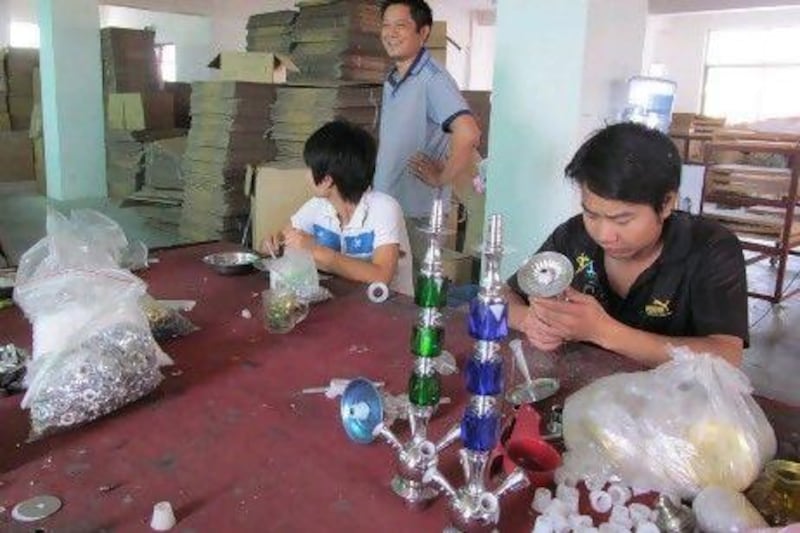DONGYANG, CHINA // It takes a skilled worker just a few minutes to put together a shisha water pipe at this assembly plant in eastern China.
There are several pieces of plastic to fit inside the piping, some large coloured blocks of glasslike plastic that have to be slipped onto the main metal tube, and a see-through water jar that finally must be screwed onto the body of the hookah.
It is no wonder the staff here at Nuopu Shisha Company in Dongyang south-west of Shanghai are well practised at making hookahs out of the 18 or so components used in each one: the plant can turn out 1,000 a day, mostly for export.
Yet on this day, there is little of the buzz one would expect of a Chinese assembly plant. The turmoil in much of the Middle East, the key market, has seen orders halve, and the company's owner, Luo Weiguo, hopes for stability in the Arab world and a recovery in demand, four years on from when he launched his assembly operation.
"Business was growing quite steadily, but in the past two years it's suffered quite an obvious drop because of the instability in Libya and Syria. The Middle East is our main market. Sales have dropped almost 50 per cent because of the crisis there," he said.
Mr Luo, 39, is not just having a difficult time because his company's hookahs are selling more slowly. Nuopu Shisha Company also has a factory in Guangdong province in the south that supplies components to other factories making shisha pipes. These other manufacturers, about 20 companies in the area around Yiwu city close to Dongyang, are also facing uncertainty.
China produces many of the world's less-expensive hookahs, with the cheapest selling wholesale for as little as 60 yuan (Dh34.6) each, although online retailers may sell them for up to 400 yuan.
More ornate models, aimed at shisha cafes rather than private buyers and with elaborately decorated water jars and hoses covered in velvet, are priced at about 300 yuan wholesale.
Before instability swept much of the Middle East, Nuopu would ship about 20 containers overseas annually, each containing up to 600,000 yuan worth of hookahs.
As demand has fallen away in countries such as Syria, which provided about 35 per cent of the company's business, the firm has looked to increase exports to markets such as Russia and North America.
Interest in China is also said to be growing, and not just in nearby Yiwu, a trading city two hours from Shanghai with a large Arab population who enjoy smoking shisha outside the city's many Muslim restaurants.
In a fusion of modern-day East Asian culture with Middle Eastern traditions, shisha is becoming popular in the "KTV" karaoke bars of China, according to Zhou Xueliu, 24, who sells Nuopu's hookahs in Yiwu.
"It's fashionable, it's popular. In one month, it's just one container for international trade because this year the international trade is bad. But for selling in China, it's getting better and better," he said.
"In Tibet, in Beijing, in Xinjiang, in every province we have customers."
There are factors other than the current turmoil in some countries that potentially could have a longer-term effect on shisha sales. Growing numbers of GCC countries are outlawing smoking in public places, with Saudi Arabia yesterday becoming the latest country in the region to announce a ban, with shisha included.
For overall sales to reach their former levels, calm must return to countries such as Syria, Mr Luo said, adding that he remains optimistic this will happen.
"Most of our clients have made their orders, but they have delayed payment because it's not the time to ship them to their home countries. Some of my clients are saying the instability will soon be over, so it's not going to last for ever."
dbardsley@thenational.ae
Follow
The National
on
[ @TheNationalUAE ]
& Daniel Bardsley on
[ @DanielBardsley1 ]







